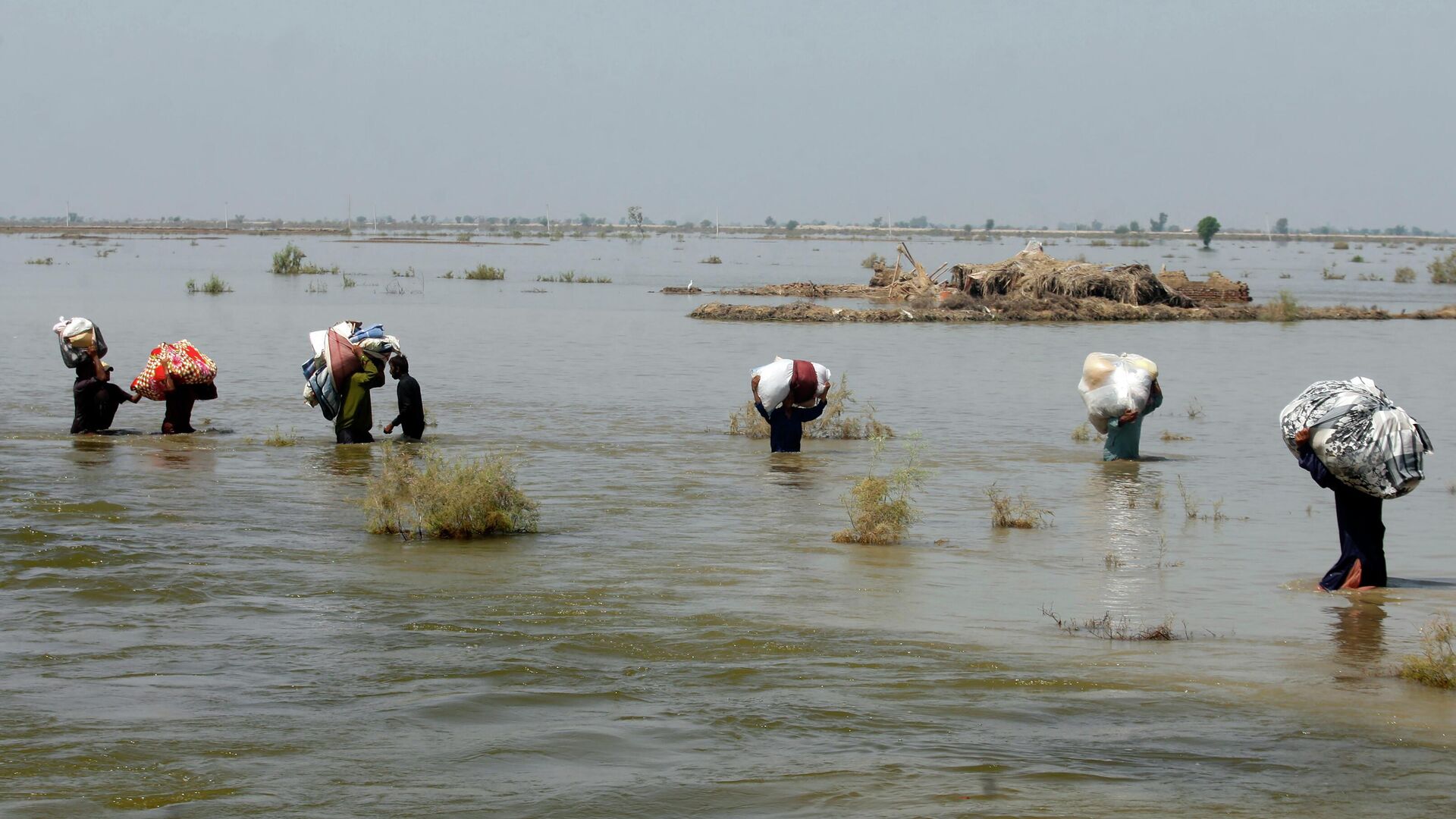https://sputnikglobe.com/20220914/flood-wreaks-havoc-as-default-risks-loom-large-in-pakistan-despite-international-support---report-1100749606.html
Flood Wreaks Havoc as Default Risks Loom Large in Pakistan Despite International Support - Report
Flood Wreaks Havoc as Default Risks Loom Large in Pakistan Despite International Support - Report
Sputnik International
Pakistan is on the brink of economic collapse as the domestic currency weakens against the greenback and putting a rocket under the price of imports, just as... 14.09.2022, Sputnik International
2022-09-14T10:29+0000
2022-09-14T10:29+0000
2022-09-14T10:29+0000
world
shehbaz sharif
pakistan
default
foreign reserves
imran khan
floods
https://cdn1.img.sputnikglobe.com/img/07e6/09/0e/1100750851_0:117:3223:1930_1920x0_80_0_0_d9258be3da45cbb88908c5bd6a9dce2f.jpg
Yields on Pakistan's five-year Sukuk - shariah-compliant bonds maturing in December 2022 - spiked by a whopping 39 percent on Tuesday, indicating a massive slide in investor confidence in the economy despite the revival of the International Monetary Fund (IMF) bail-out package.Pakistani daily The News cites official sources as saying that international aid has lost its relevance in the wake of the country's devastating floods.In late August, the IMF approved the long-awaited $1.17Bln bail-out package for Pakistan, which has $7.81Bln foreign exchange reserves, which would sustain fewer than 40 days of imports.The "catastrophic" floods, as described by Prime Minister Shehbaz Sharif, damaged crops in Sindh and Balochistan provinces, putting food security in the country under threat and, according to preliminary estimates from Pakistan's Finance Ministry, have caused $30Bln to $40Bln of economic losses.Sharif has said that Pakistan's annual GDP growth may decline by 2 percent because of flood damage, and the devastation may force the government to import more, resulting in a widening trade deficit.The State Bank of Pakistan (SBP) has taken steps to curb unnecessary imports to control the trade deficit. "It is further stated that the SBP has told banks to seek permission before initiating transactions for the import of motor cars, mobile phones, and machinery," the country's Central Bank said on Tuesday.Meanwhile, Finance Minister Miftah Ismail oozed confidence that the default threat could be averted, saying the incumbent government has steered the country out of the risk.Islamabad will have to pay nearly $21Bln in external obligations in the next 12 months, which is almost three times its present foreign exchange reserves. So far, China has extended loans of up to $16.8Bln to Pakistan, making it the largest creditor of the country.
https://sputnikglobe.com/20220902/imf-warns-of-unrest-in-pakistan-as-imran-khan-blasts-imported-govt-for-economic-disaster-1100309569.html
pakistan
Sputnik International
feedback@sputniknews.com
+74956456601
MIA „Rossiya Segodnya“
2022
Rishikesh Kumar
https://cdn1.img.sputnikglobe.com/img/07e4/08/04/1080055820_0:0:388:389_100x100_80_0_0_40018ee210946d65d49ffba4f4c008e1.jpg
Rishikesh Kumar
https://cdn1.img.sputnikglobe.com/img/07e4/08/04/1080055820_0:0:388:389_100x100_80_0_0_40018ee210946d65d49ffba4f4c008e1.jpg
News
en_EN
Sputnik International
feedback@sputniknews.com
+74956456601
MIA „Rossiya Segodnya“
Sputnik International
feedback@sputniknews.com
+74956456601
MIA „Rossiya Segodnya“
Rishikesh Kumar
https://cdn1.img.sputnikglobe.com/img/07e4/08/04/1080055820_0:0:388:389_100x100_80_0_0_40018ee210946d65d49ffba4f4c008e1.jpg
shehbaz sharif, pakistan, default, foreign reserves, imran khan, floods
shehbaz sharif, pakistan, default, foreign reserves, imran khan, floods
Flood Wreaks Havoc as Default Risks Loom Large in Pakistan Despite International Support - Report
Pakistan is on the brink of economic collapse as the domestic currency weakens against the greenback and putting a rocket under the price of imports, just as unprecedented floods have wrought colossal damage, inundating vast territories in the country.
Yields on Pakistan's five-year Sukuk - shariah-compliant bonds maturing in December 2022 - spiked by a whopping 39 percent on Tuesday, indicating a massive slide in investor confidence in the economy despite the revival of the International Monetary Fund (IMF) bail-out package.
Pakistani daily The News cites official sources as saying that international aid has lost its relevance in the wake of the country's devastating floods.
"No one is taking the looming economic challenges seriously, since, without major dollar injections, the liquidity crunch is going to haunt policy-makers every passing day," the report said.
In late August, the IMF
approved the long-awaited $1.17Bln bail-out package for Pakistan, which has $7.81Bln foreign exchange reserves, which would sustain fewer than 40 days of imports.
The "catastrophic" floods, as described by Prime Minister Shehbaz Sharif, damaged crops in Sindh and Balochistan provinces, putting food security in the country under threat and, according to preliminary estimates from Pakistan's Finance Ministry, have caused $30Bln to $40Bln of economic losses.
Sharif has said that Pakistan's annual GDP growth may decline by 2 percent because of flood damage, and the devastation may force the government to import more, resulting in a widening trade deficit.
"Based on our preliminary estimates, the current account deficit may increase by $4.4Bln (1 percent of GDP) – assuming no counter-measures are taken, whereas around 30 percent of the Consumer Price Index (CPI) basket is exposed to the threat of higher prices," Karachi-based JS Global Research said in a report.
The State Bank of Pakistan (SBP) has taken steps to curb unnecessary imports to control the trade deficit.
"It is further stated that the SBP has told banks to seek permission before initiating transactions for the import of motor cars, mobile phones, and machinery," the country's Central Bank said on Tuesday.

2 September 2022, 13:13 GMT
Meanwhile, Finance Minister Miftah Ismail oozed confidence that the default threat could be averted, saying the incumbent government has steered the country out of the risk.
"Flash floods worsened the [economic] situation. But we will manage the economy efficiently. There is no chance of default now," the minister said, when asked to comment on warnings from former prime minister, Imran Khan, about default in the absence of political and economic instability.
Islamabad will have to pay nearly $21Bln in external obligations in the next 12 months, which is almost three times its present foreign exchange reserves. So far, China has extended loans of up to $16.8Bln to Pakistan, making it the largest creditor of the country.




